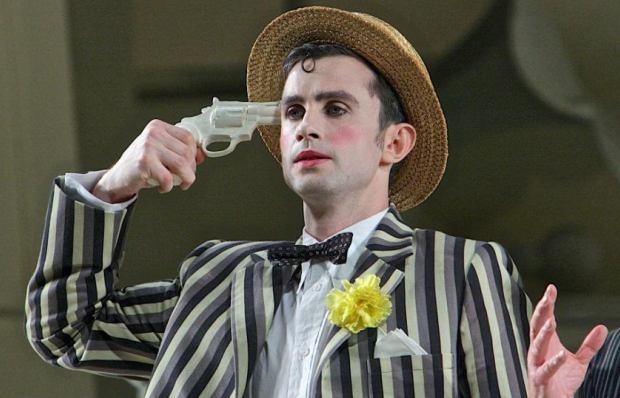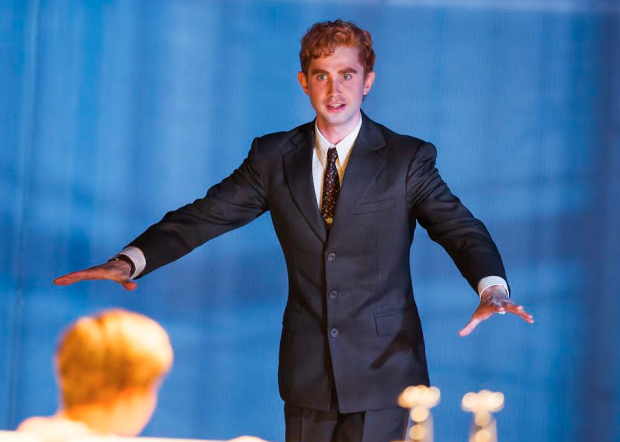Anthony Gregory – ENO's wand'ring minstrel
The tenor discusses his hectic schedule and the challenges it poses to a newlywed

© Francis Loney
The young English tenor Anthony Gregory has enjoyed a rapid rise to fame, and in 2014 he was voted Breakthrough Artist of the Year in the WhatsOnStage Opera Poll. He also got married recently – to mezzo-soprano Kitty Whately, another singer who’s going places.
Gregory is one of a select group of young singers chosen by ENO for their young artists scheme – a ‘Harewood Artist’. He is currently playing the ingénu lead in the company’s latest revival of Gilbert and Sullivan’s The Mikado in Jonathan Miller‘s celebrated staging.
Nanki-Poo is a comic role in a very funny operetta. I haven’t seen you do much comedy yet: is it your thing?
I do like playing the joker but I don’t get to do it very often! Watching somebody like Richard Suart [who sings Ko-Ko] every day is a masterclass in timing. Most people in the cast have done the show before, so with the dialogue it was a challenge to make it as good as I wanted it; but every day you add another level. The comedy comes with relaxation I think. If you can be relaxed in what you’re saying and singing, it’s easier to be funny. And I enjoy singing this innocent, slightly naïve schoolboy character.
This production is 28 years old – almost the same age as you! Has Jonathan Miller been to any of the rehearsals?
Yes, he’s been in for two or three days every week. He says relatively little but they’re always very precise things. It’s been wonderful to learn from him.
What does being an ENO Harewood Artist involve?
It involves a lot of dedication! We get one-to-one coaching in repertoire and performance techniques, and we cover scheduled singers before progressing to small roles of our own. If they want you for a particular production and the role is right for you you’re expected to do it, but they also like you to take opportunities elsewhere when they present themselves. I had to miss the first week of Mikado rehearsals while I was in Madrid for Alcina, and they were very understanding.
When there’s a likely role on the horizon I’m able to go and have a chat with John McMurray [ENO’s head of casting] and Sophie Joyce [Harewood Artists manager] because they know my voice so well. There’s a great deal of trust there.
Sometimes a role might be good for me elsewhere but in this house, the Coliseum, I’m not quite ready for it. That’s what makes these discussions so important. Of course, it can be tempting to dive in too early. There was quite a bit of discussion about me singing Ferrando in Così fan tutte here, a role I’d already done for English Touring Opera. When I did it on tour it was fine for me, but in this huge space I felt that at this stage in my career it was a little too much. With the pressure of the role and the technical challenges it poses it didn’t feel right, and they were 100% behind my decision.
Do you have a sense of what roles will be good for you in future years?
Yes. We have sessions where we talk about repertoire and try out all kinds of roles. It’s really important to test yourself in a safe environment – and I’m quite cautious as a person.
You have to be ambitious to do this job, though. Being cautious rubs up against your ambition, doesn’t it?
True. But, for example, I really want to sing Alfredo in La traviata in five or six years’ time. If I were to sing it now, when I can just about get through it, what would be the point? I’d rather do it when I know I can sing it well.
Would you like to be a Verdi tenor?
I would. I don’t think a lot of the Verdi rep would suit me, but the lighter stuff like Alfredo will fit me in the future. There are so many tenors who have the range to sing certain roles, but it’s the colour and the richness of the voice that matter. And you can’t push that.
When you get to a certain age you realise where your voice is comfortable. I don’t think I’ll ever sing very heavy repertoire because of the nature of my build, but you never know. I wouldn’t close a door.
English tenors are often pigeon-holed as Britten singers. Is that the case with you? You’ve already done The Turn of the Screw at Glyndebourne.
Britten suits my voice and I love the characters. I’d love to do Albert Herring before I get too old! The Turn of the Screw was wonderful, of course. Tenors don’t often get to sing that kind of character. And Jonathan Kent‘s production was breathtaking. It’s hard to imagine how it could be better done.

© Tristram Kenton
You’ve been singing a lot of early music and Baroque recently. Is that because it’s a rite of passage for a young singer, or is it an area of repertoire you’re keen to inhabit?
A bit of both. Having a lightish tenor voice it’s something you learn when you’re young. When I was at the Royal College of Music we had an affiliation with Laurence Cummings‘s London Handel Festival, so we did a Handel opera every year. That way I got the chance to do Rodelinda and Il pastor fido – quite unusual repertoire, but perfect for young singers. And the style is so interesting. I still like to offer a Handel aria at auditions; it shows a bit of dexterity.
And you need stamina too. You’ve played in two taxing productions of Alcina this year.
In Madrid I shared the role of Oronte with Allan Clayton, and we had to wear a huge gorilla suit. There was a lot of rolling and jumping around – I don’t think I’ve ever sweated so much in my life. But it’s all about practice and keeping fit. I’ve found that when you’re doing a physical role, if you can offer a director as much physicality and energy as you can, they’re happy.
I’m very lucky to have the voice I have. As a child I sang as a treble, then I continued as a tenor and built a technique around that, singing roles that suit the colour of my voice. People say my voice isn’t typically English, so a more Italian repertoire is more within my grasp – and it’s what I want to do.
You recently married another busy singer, Kitty Whately. Do you manage to see enough of each other?
No, actually. Kitty’s just come back from Bergen where she’s been doing A Midsummer Night’s Dream. We were together for a week after we got married, but since then we haven’t seen each other for two months. It’s the part of the job I struggle with, if I’m honest. It sounds very glamorous to go to somewhere like Madrid for six weeks, but it’s not because you’re spending a lot of time on your own. You just have to manage things.
Now that Kitty’s back we’ll be together until February, when I’m off to Lisbon for Gluck’s Iphigénie en Tauride and then in March and April to Omaha, Nebraska, to do Handel’s Semele. After that I’ll spend the summer at Glyndebourne singing Flute in A Midsummer Night’s Dream.












